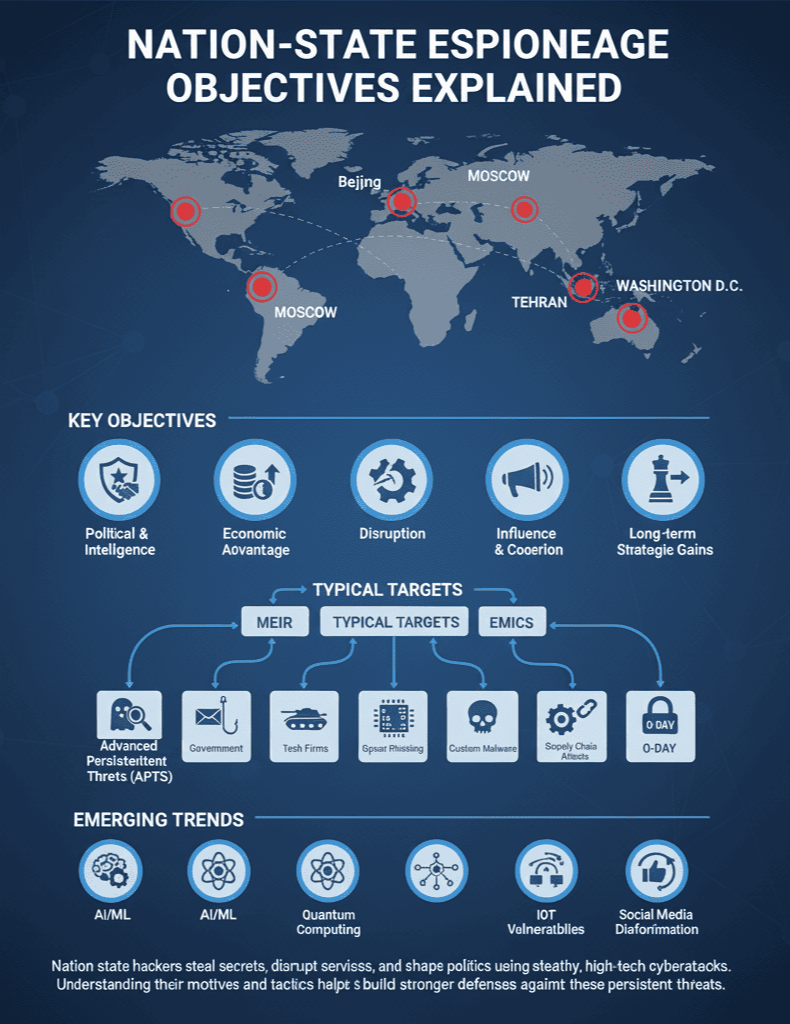Nations spy because they need to stay ahead. Simple as that. From military tech blueprints to diplomatic cables, state hackers work around the clock to steal secrets that might give their country an edge. Think of it like a high-stakes poker game, except instead of cards, they’re playing with classified files and trade secrets worth billions.
The tools have changed – gone are the days of hidden microphones and dead drops – but the game remains the same. These aren’t random attacks by basement-dwelling hackers; they’re calculated moves on a digital chessboard where one wrong move could expose an entire operation.
Want to know what really drives nations to risk international incidents just to peek at their neighbors’ screens? Let’s pull back the curtain.
Key Takeaways
- Nation state actors focus on political, military, and economic intelligence to maintain or increase their global influence.
- Espionage includes disrupting critical infrastructure and influence operations besides traditional data theft.
- Defending against such threats requires layered cybersecurity, user awareness, and advanced threat intelligence.
Why Nation State Espionage Objectives Matter
A keyboard clicks softly in Moscow. Or maybe Beijing. Or Tehran. Right now, someone’s trying to steal U.S. military secrets. Not with spy cameras or lock picks – those tools are old school. Today’s spies sit at computers, typing code that reaches across oceans to grab classified files.
Modern espionage is weird that way. No fake passports needed. No midnight border crossings. Just hackers in office buildings, drinking coffee while they hunt through other countries’ private files. Patient. Methodical. Dangerous.
At any given time, discreet intrusions are underway, few known, many unseen.
These digital break-ins aren’t random. Countries target specific secrets: military tech specs, diplomatic messages, trade deals, and industrial designs. Recent cyber reports [1] show that global espionage attempts against military and defense sectors have grown significantly over the last decade, reflecting how political rivalry now plays out in cyberspace.
When governments and companies understand what spies are after, they can build better defenses. Like noticing someone’s been snooping around the fence before they actually break in.
Smart security teams watch for these warning signs. They know that somewhere, right now, someone’s probably trying to crack their codes.
What Drives Nation State Espionage?

Political and Military Intelligence
Nation states often target classified government files and military secrets. They want to know what other countries are planning,whether it’s troop movements, weapons development, or diplomatic strategies. This information gives them leverage in negotiations or conflict scenarios.
Economic and Technological Advantage
Stealing intellectual property, trade secrets, and research data is a huge motivation. By acquiring competitor’s innovations covertly through cyber espionage techniques, countries try to boost their own industries without investing the time or money in research and development. These underlined tactics often show how espionage evolves with new digital strategies and hidden infiltration methods.
Disruption and Destabilization
Digital attackers don’t always want the goods – they’re after chaos. When hackers break into power systems, phone networks, or banking computers, they’re trying to throw a wrench in the works. A power outage here, a frozen ATM there, and suddenly a whole city’s stumbling around in the dark.
These hits make people nervous about basic services they usually take for granted. And when folks can’t trust their electricity to stay on or their money to be there when they need it, everything starts moving slower – from military operations to business deals.
Like dropping sand in an engine, these attacks gum up the works of modern life. Think about it: When the lights go out in a major city, or when nobody can get cash from their bank, panic starts creeping in. Streets get tense. People get angry.
The whole system starts to sputter and cough. That’s exactly what these attackers want – not to steal, but to shake things up. To make people doubt. To slow everything down to a crawl.
Influence and Coercion
Espionage also includes information operations designed to sway public opinion or policymaking. This might involve leaking sensitive data strategically, spreading disinformation on social media, or manipulating political narratives to favor the attacker’s goals.
Long-term Strategic Gains
Nation states don’t just want quick wins. They build persistent cyber access to track adversaries over time. This ongoing intelligence gathering prepares them for future conflicts or negotiations and keeps them ahead in a rapidly shifting geopolitical landscape.
Typical Targets in Nation State Espionage
Nation state hackers don’t attack blindly. They focus on specific high-value targets:
- Government agencies handling sensitive policy or diplomatic data.
- Military and defense installations with classified operational intelligence.
- High-tech companies developing cutting-edge technology.
- Critical infrastructure operators like power plants, water supplies, and telecom networks.
- Influential individuals such as politicians or defense contractors.
These targets represent the core of national security and economic competitiveness, making them prime objectives for espionage.
How Do Nation States Conduct Espionage?
Nation state cyber espionage blends technical skill with patience and subtlety. These attackers often use techniques that reflect deep attacker motivations and long-term planning rather than random intrusions. They rely on:
- Advanced Persistent Threats (APTs): Long-term, stealthy intrusions that maintain access without detection.
- Spear phishing and social engineering: Customized attacks that trick specific individuals into revealing credentials.
- Custom malware designed to evade defenses and extract sensitive data.
- Supply chain attacks, infiltrating trusted third parties to reach main targets.
- Exploiting day-zero vulnerabilities before patches exist.
The Real-World Impact: Case Studies
Source: International Policy Zone
North Korea’s Lazarus Group is a classic example. Their cyber espionage campaigns have targeted banks, cryptocurrency exchanges, and critical infrastructure worldwide. Their objectives include funding the regime and gathering military intelligence.
Countries in the Middle East spy on each other through computers. They break into their rivals’ networks to steal secrets and mess things up. When two countries get mad at each other, the hacking gets worse. Simple as that.
The U.S. deals with the same problem. Foreign hackers keep breaking into American stuff – government offices, tech companies, you name it. They’re after anything valuable: military plans, new inventions, company secrets.
Sometimes it’s just regular criminals. But a lot of times, it’s actually other governments pretending to be criminals. That’s what makes this whole thing so messy. When someone breaks into a U.S. company’s computers, it’s hard to tell if it’s a regular thief or a spy working for another country.
They all use the same tricks. The attacks happen so often now that big companies have to spend huge money just to keep their secrets safe.
Defending Against Nation State Espionage

If you’re responsible for cybersecurity, defending against such sophisticated threats feels daunting. But certain best practices can help mitigate risks:
- Use strong, unique passwords paired with multi-factor authentication.
- Regularly patch software and firmware on all devices, especially IoT endpoints.
- Train employees to recognize spear phishing and social engineering attempts.
- Encrypt sensitive data both at rest and in transit.
- Maintain secure backups to recover from ransomware or sabotage.
- Use intrusion detection systems and threat intelligence feeds to catch early signs of compromise.
By layering defenses and fostering awareness, organizations reduce their attack surface and improve resilience.
Emerging Trends Shaping Nation State Espionage

Nation state actors don’t sit still, they adapt fast, almost like they’re always a step ahead. What’s new is how they’re using machine learning and artificial intelligence. These tools help them automate attacks and find weak spots in systems quicker than ever before.
It connects closely with threat actor motivations and profiles that shape how different states plan digital operations. It’s not just about brute force anymore; it’s about smart, targeted moves that can slip past defenses before you even know what hit you.
Then there’s quantum computing, which might sound like science fiction but is edging closer to reality. When it arrives, it could break many of the encryption methods we rely on today. That means secrets thought safe could suddenly be exposed.
It’s a looming threat that cybersecurity experts are watching closely, trying to develop new ways to protect data that can stand up to quantum power. Social media platforms have turned into battlegrounds too. They’re no longer just places to share cat videos or news updates. Instead, they’re being used for disinformation campaigns tied to espionage.
False information spreads fast, and it can influence public opinion or even political outcomes. Analysts examining cyber espionage techniques [2] indicate that coordinated disinformation campaigns now occur alongside network intrusions to amplify their geopolitical impact.
On top of that, the explosion of internet-connected devices, what we call the Internet of Things or IoT, has opened up a whole new set of problems. Every smart thermostat, security camera, or even light bulb connected to the internet is a potential entry point for attackers. The more devices there are, the more doors hackers can try to open.
For anyone interested in national security or cybersecurity, keeping up with these changes isn’t optional. The threat landscape shifts constantly, and defenses have to move just as quickly. It’s a fast-moving game, and staying informed is the only way to keep up.
Cybersecurity for the Private Sector: Why You Should Care
There’s a quiet kind of danger creeping into businesses these days, and it’s not just governments that have to worry about spies. Foreign hackers aren’t after just top-secret files anymore.
They want the stuff private companies keep close,new tech, secret recipes, client lists. And they’re getting bolder, sneaking in where you least expect it.
Small businesses shouldn’t just brush this off. These hackers don’t care if you’re big or small. If there’s a way in, they’ll find it. That family-run factory making parts for bigger companies? That’s a prize. The little tech startup with a fresh app? Definitely on their radar.
When these hackers hit, the damage is real:
- Supply chains get tangled up
- Work grinds to a halt
- Secrets vanish
- Competitors suddenly know your next move
- Customers start doubting you
What’s scary is that regular businesses are now part of this international spy game. The IT guy might be fighting off foreign spies without even realizing it.
The person sorting through job applications could be the first to spot a fake resume meant to steal info. Keep an eye out for these signs:
- Strange computer activity late at night
- Login attempts from faraway countries
- Fake emails aimed at certain employees
- Computers acting weird
- Data moving in odd ways
Here’s the thing,protecting your business from this isn’t just the tech team’s job anymore. Everyone, from the CEO to the newest intern, needs to know what to watch for. You don’t have to be a tech whiz, but knowing the basics might just save your business from a serious hit.
These aren’t basement hackers messing around. They’re professional spies with serious resources, and they want in,right through companies just like yours.
Nation State Espionage: Ongoing Challenges and Strategies
Nation state espionage is a shadowy contest shaping geopolitical power in the 21st century. It thrives on stealth, patience, and high-tech tools that outpace traditional defenses. Yet, understanding the motivations behind these attacks reveals patterns and points of leverage.
The key is layered security measures combined with continuous vigilance. You can’t prevent every attack, but you can reduce the chances and limit the damage. Cyber defense isn’t a one-time project but an ongoing commitment.
Organizations and nations that adapt fastest will maintain the upper hand in this silent war. And for anyone interested in cybersecurity, grasping nation state espionage objectives is a crucial step in that journey.
FAQ
What drives nation state espionage objectives today?
Nation states conduct cyber espionage and cyber operations to gather intelligence, strengthen national security, and gain access to sensitive data. From the dark web to social media, threat actors use advanced persistent attacks, phishing attacks, and custom malware.
State hackers, often state sponsored, target the United States, the Middle East, and critical infrastructure to achieve geopolitical objectives.
How do threat actors conduct cyber attacks for espionage?
Threat actors rely on attack vectors such as spear phishing, supply chain attacks, and social engineering to exploit day vulnerabilities and infiltrate networks. These cyber threats often disrupt critical systems or steal national intelligence.
Many nation state cyber campaigns involve unauthorized access to intellectual property, proving that modern espionage operations extend far beyond traditional spying methods.
Which technologies and trends shape modern cyber warfare?
Emerging technologies like machine learning, artificial intelligence, and quantum computing are reshaping cyber warfare and boosting cyber capabilities for both attackers and defenders.
As emerging threats expand, cyber threat actors exploit IoT devices and mobile security gaps. Staying informed about these emerging trends helps organizations mitigate the risks and strengthen their overall cyber defense posture.
How can organizations strengthen cyber security against state hackers?
To defend against cyber attacks, organizations must adopt best practices and layered security measures. Effective patch management, continuous threat intelligence, and awareness of day exploits help reduce exposure.
The private sector should also secure third party connections and apply strong cyber defense strategies to prevent data breaches caused by financially motivated or state sponsored cyber actors.
Why is studying nation state espionage important for the future?
Studying espionage operations through detailed case studies helps reveal how cyber threats evolve and influence geopolitical tensions. Reviewing the latest articles or a comprehensive case study provides insight into national intelligence strategies and cyber defense methods.
As cyber attacks increase, understanding these patterns allows organizations to anticipate future threats and comply with international law to mitigate the risks.
Conclusion
Nation state spies aim far beyond stealing data—they target political, military, and economic power. Defending against them demands more than software; it requires awareness, strong cybersecurity layers, and constant learning.
To stay ahead of evolving cyber threats, explore real-world insights and strategies at NetworkThreatDetection.com, where cybersecurity teams gain real-time threat modeling, automated risk analysis, and the intelligence needed to outsmart even the most advanced nation state adversaries.
References
- https://networkthreatdetection.com/threat-actor-motivations-and-profiles/
- https://networkthreatdetection.com/cyber-espionage-techniques-used/


